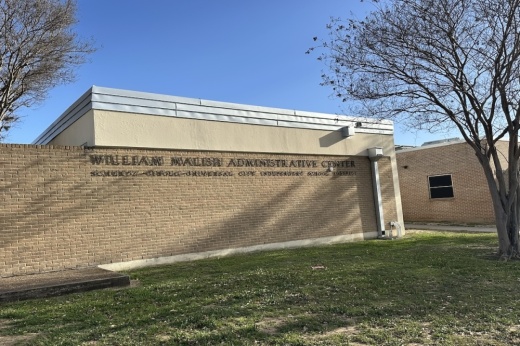The FY 2025-26 budget was passed with a balance between total revenues and total expenditures in the general fund—both equaling $177.93 million. The budget makes room for $17.15 million in revenue that would come to the district if the VATRE is successful, with the district setting its FY 2025-26 voter-approval tax rate at $1.1969 per $100 valuation. This is an increase of $0.06 per $100 from FY 2024-25.
The overview
Of general fund revenues, property taxes account for $58.36 million, an increase of $5.5 million due to the higher proposed tax rate, according to a presentation by Chief Financial Officer Brian Moy. The district will see a reduction in taxable value of $889 million due to likely new homestead exemptions Senate Bill 4 and Senate Bill 23.
State aid revenue increased by $21.4 million for a total of $104.08 million, including $8.3 million in district funding that would come from a successful VATRE, Moy said.
The vast majority of general fund expenditures come from salaries and benefits, totaling $123.77 million, according to the presentation. Compensation increased by $7.7 million, including $4.5 million state mandated by House Bill 2.
More details
The board called for a VATRE to address various deferred projects and inflationary costs, as well as have a long-term plan for future staff salary increases, Moy said. Over $11 million in capital outlay costs are pegged for projects in fine arts, athletics, Career and Technical Education, technology and safety.
Inflationary costs include property, auto and liability insurance, which have gone up by 140% in cost since FY 2019-20, according to the presentation. Moy said that small increases to the district's basic allotment have not been enough to keep up with the inflation.
"We're asking the voters, the local community, to help address what the state hasn't. If we wait two more years to see if the legislature does anything in 2027, might as well wait until 2029, 2030. When do we stop waiting on the state?," Moy said.
If the VATRE does not pass in November, the district will have to consider actions ranging from an immediate hiring freeze to scaling back athletics and fine arts programs, Moy said.
"This isn't meant to be a scare tactic, it's meant to show that we've actually thought about what types of things [we would] have to bring for [board] consideration in order to reduce expenditures," he said.
Offering input
Board Vice President Letticia Sever said that the board has "taken a look at every angle of our budget" and that district program-related expenditures should be top of mind when considering the VATRE.
"We have done everything we can to put money right in front of the student, which is through our teachers and anyone who works with our students, but everything else has been kind of bumped aside and we can no longer do that anymore," Sever said.
Former SCUCISD employee Carla Barnes agreed and said during public comment that it is time to "continue to invest in our students, but also the infrastructure around our students."
Trustee Amy Thomas said extra funding through a VATRE would be controlled by SCUCISD—not the state.
"All the money that we've ever gotten has strings attached ... and this actually gives us back local control, which we always say up here is the number one thing that should be happening," Thomas said.
Next steps
SCUCISD's VATRE will be placed on ballots in Bexar and Guadalupe counties Nov. 4. Early voting will be held from Oct. 20 to Oct. 31. The last day to register to vote is Oct. 6.





